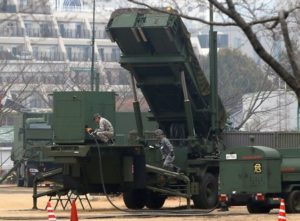by WorldTribune Staff, March 8, 2017
Japanese lawmakers called on their nation to develop the ability to pre-emptively strike North Korean missile facilities, two days after three of four missiles fired from the communist nation landed in waters near Japan.
“It is time we acquired the capability,” said Hiroshi Imazu, the chairman of the Liberal Democratic Party’s (LDP’s) policy council on security. “I don’t know whether that would be with ballistic missiles, cruise missiles or even the F-35, but without a deterrence North Korea will see us as weak.”

Meanwhile, China on March 8 appeared to be exploiting the crisis.
Beijing warned that North Korea and the United States were racing towards a “head-on collision” and called on both sides to apply the brakes to avert a security crisis, AFP reported.
Several U.S. presidents have unsuccessfully prevailed upon China to thwart its closely-allied communist regime in North Korea from realizing its nuclear weapon and missile ambitions.
China is the lone foreign power providing strategic and financial assistance to North Korea.
Chinese Foreign Minister Wang Yi’s warning came after a series of events that has sent regional tensions soaring, including provocative North Korean missile tests, the annual U.S.-South Korean wargames that often prompts angry rhetoric from Pyongyang and the death by poisoning at the Kuala Lumpur, Malaysia airport of Kim Jong-Nam, the oldest son of the late North Korean dictator Kim Jong-Il.
Related: Kim Jong-Nam’s Chinese bodyguards disappeared before his assassination, Feb. 22
The U.S. State Department said that Secretary of State Rex Tillerson will visit Japan, South Korea and China starting next week, his first trip to the region, with talks to focus on the North Korean “threat.”
Japan has so far avoided acquiring bombers or cruise missiles with enough range to strike other countries, but lawmakers said all options should be considered amid the growing threat posed by Pyongyang, which fired at least four missiles toward Japan on March 6, three of which splashed down in waters within Japan’s exclusive economic zone (EEZ).
“If bombers attacked us or warships bombarded us, we would fire back. Striking a country lobbing missiles at us is no different,” said Itsunori Onodera, a former defense minister who heads a ruling LDP committee looking at how Japan can defend against the North Korean missile threat. “Technology has advanced and the nature of conflict has changed.”
The idea has faced stiff resistance in the past but the latest round of North Korean tests means Japan may move more swiftly to enact a tougher defense policy, Reuters reported.
“We have already done the ground work on how we could acquire a strike capability,” said a source with knowledge of Japan’s military planning. He asked not to be identified because of the sensitivity of the issue.
Any weapon Japan acquired with the reach to hit North Korea would also put parts of China’s eastern seaboard within range of Japanese munitions for the first time. That would likely anger Beijing, which is strongly protesting the deployment of the advanced U.S. Terminal High Altitude Area Defense (THAAD) anti-missile system in South Korea.
“China has missiles that can hit Japan, so any complaints it may have are not likely to garner much sympathy in the international community,” said Onodera.
Wang, China’s foreign minister, continued China’s criticism of the THAAD deployment, reiterating Beijing’s “strong opposition” and calling on Seoul to “cease and desist.”
